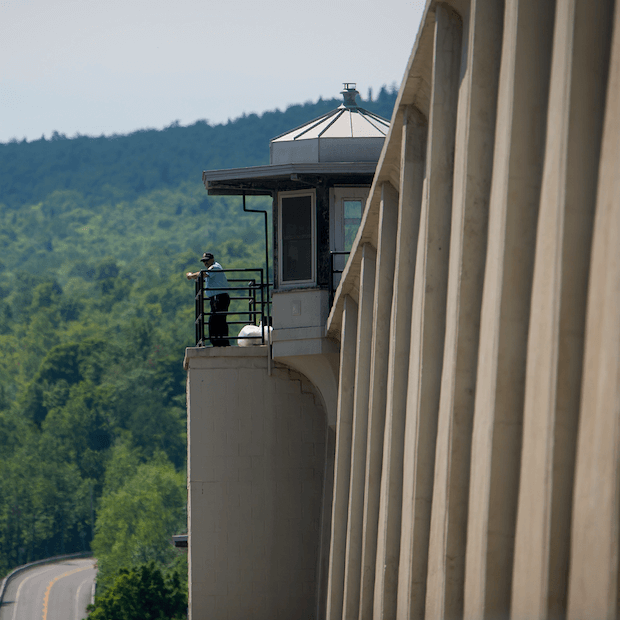If we are going to tackle the issue of mass incarceration in our prison system – including prison abuse, legislation failure, overcrowding and bankrupt budgets – the media needs to drastically improve its coverage in order to raise public awareness and increase pressure for reform.
Unfortunately, it’s easier said than done.
Shut out: The media’s restricted access to prisons
In most cases, it’s actually extremely difficult for reporters to get inside prisons.
The rules and regulations for granting media vary by state and appear to be arbitrary considering they can be based on previous legislation, administrative regulation, individual cases or a combination thereof.
There are often no official channels for reporters to go through, and when there are, reporters can still be denied with little explanation.
The Society of Professional Journalists did a national review of media access policies in prisons and found that the policies varied wildly. Connecticut, Delaware, Wyoming, Kentucky, Louisiana, Maine, Maryland, Massachusetts and Nebraska generally approve media requests with the freedom to deny specific requests.
On the other hand, Arizona, Alabama, Georgia, Louisiana and Michigan generally deny media requests without reasons listed.
Delaware, Georgia, Illinois, Louisiana, Minnesota, Mississippi and Montana have policies so brief and vague that SPJ was unable to analyze them.
The only places that have due process for media to complain if they are denied are District of Columbia, Idaho and Maine, with strict restrictions and specifications.
Why don’t prisons allow reporters?
Illinois Gov. Pat Quinn refused to allow any media access to prisons when faced with reporter requests after a local report revealed vermin infestations, basement flooding and severe overcrowding. Quinn also declined to explain the shut out until a local reporter, Rob Wildebower published an article detailing the denial of access, and then Quinn told media that a prison “isn’t a country club.”
Corrections officials have used a variety of reasons for restricting media. A common assertion is that it is too much of a security risk because journalists will need protection and could potentially panic when faced with inmates.
Others explain that publicity can do more harm than good: stories featuring inmates can glorify them and cause emotional harm to victims of crime, stories detailing prison abuse can spread unrealistic impressions to the public and even stories that appear positive, such as articles about educational programs in prisons, can incite outrage from those who believe tax dollars should not be spent on inmates.
How much is the media to blame?
Though media often face obstacles to coverage, there is a case to be made that media also do not focus enough on reporting on prisons.
Ted Gest, president of Criminal Justice Journalists, estimated that there are only around a half dozen reporters across the entire country just devoted to corrections reporting. Meanwhile, Paul Wright, a former Washington inmate who founded Prison Legal News in 1990, said that most media organizations do not see corrections as an important beat.
Reporters who do cover it tend to take statements from officials as truth without investigating further; Wright has publicly criticized the New York Times for not having a dedicated corrections reporter.
Reporters have cited the access restrictions as well as the trickiness of navigating the prison system as reasons for the lack of coverage. Further, they constantly run into credibility issues while on the job, according to Frank Green, who covered prisons for the Richmond Times-Dispatch, as prisoners and guards alike will be dishonest and mislead regularly.
How reporters can still do their job
Despite corrections departments’ best efforts, there are many reporters who have covered prisons, though historically it has taken years of appeals, lawsuits and Freedom of Information Act requests to get the job done.
[postquote]
Courts have ruled that journalists have the same right to access as the general public does. So, journalists who prove that the public has been granted a certain amount of access can win out if they have the resources.
After Wildebower’s report on being denied access from Illinois prisons, they still wouldn’t budge. But when his radio station obtained two pro bono attorneys and threatened a federal lawsuit, the governor backed down. He allowed tours with no tape recorders or video cameras, and no individual interviews.
And when Joy Lukachick reported on the death of an inmate at Hays State Prison in Georgia, she obtained sources who helped her use Georgia’s open-records laws to trace administrative incompetence at the prison that refused to fix broken locks at the facility for years.
Additionally, though corrections officials can make it hard to talk to inmates, they can’t make it impossible. Inmates are allowed to write letters, and most have access to phone calls if reporters are willing to pay hefty fees.
Our take
Though the media do not have the full blame for the lack of coverage of prisons, they unfortunately do have to shoulder the responsibility to change it. It is entirely too common for corrections officials to shut journalists out, whether it is actually for security reasons or because they are afraid of the spotlight being shined inside overcrowded, underfunded prisons.
Currently, one out of every 100 of U.S. citizens are in prison, a population too great to be ignored. The longer the media disregards the issues going on inside of our prisons, the longer it will take for the public to become aware of the abuse, overcrowding, misconduct, and financial corruption buried in our broken criminal justice system.
Have something to add to this story? Comment below or join the discussion on Facebook.
Header image: Getty









































